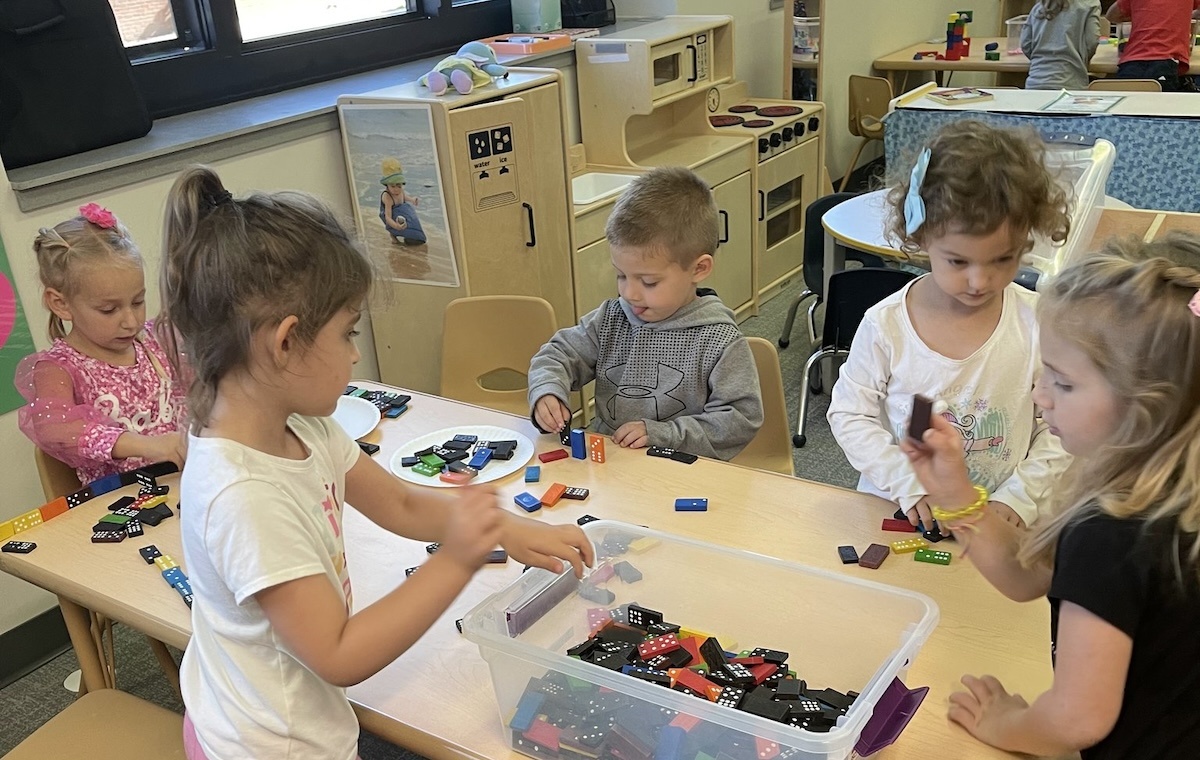
Building Strong Children, Families, and Communities
Head Start looks toward another year of early education
By Lourin Sprenger | Aug. 23, 2025
For more than half a century, northern Michigan’s Head Start, a government-funded program offered through Northwest Michigan Community Action Agency (NMCAA), has been a cornerstone of early childhood education and family support.
“We’re providing comprehensive services—educational, social, and health-related—that support both children and their families,” says Shannon Phelps, NMCAA director of child and family development. “It’s about making sure families have the resources and tools they need to thrive.”
Since its launch in 1974, the anti-poverty program has provided generations of children with a strong start in life. According to NMCAA, since the year 2000 alone, Head Start has reached more than 28,000 children and their families across 10 northern Michigan counties.
By blending Head Start federal funding with Michigan’s Great Start Readiness Program state funding, the agency is able to serve 573 Head Start (preschool-aged kids) slots and 317 Early Head Start (infants and toddlers) slots in our region this year, offering both center-based and home-based services. Those services can include play groups and parent groups, parent-teacher conferences, family events and workshops, learning plans, and a play-based curriculum to make lifelong learning fun.
Navigating the Need
According to HeadStart.gov, families qualify for Head Start if their household income is at or below the poverty level. “Families who receive public assistance (TANF, SSI, or SNAP), and those with children in foster care or children who are homeless, also qualify regardless of income,” the website notes.
Today, the need for Head Start’s services has never been greater. Rising childcare costs and limited openings at Up North facilities are pushing more families to seek affordable, high-quality care.
Despite uncertainty in national and state budgets—the independent, nonpartisan Center for American Progress found that the reduction in SNAP benefits in President Trump’s “One Big, Beautiful Bill” would put 37 percent of Head Start enrollees and parents at risk of losing access—Head Start’s funding has remained consistent thus far.
“We will continue to be here for those who need us most,” Phelps says. “Regardless of what happens moving forward, we will keep showing up and be there to support our families.”
As the program looks to the future, outreach remains a priority. Leaders want to ensure that families—especially those in rural or isolated areas—know Head Start is available and accessible. Their message is simple but powerful: Head Start changes lives, whether it’s a toddler learning their first words, a parent gaining confidence through leadership, or a teacher watching their students thrive.
From Parent to Teacher
Perhaps no story embodies the transformative power of Head Start more than that of Judy Abernethy. Now a lead teacher with more than three decades of experience, Abernethy began her journey as a young parent in the program.
“Head Start was there for my family when I needed it most,” she says. “Two of my children had special needs, and the program gave us the support, resources, and encouragement to help them succeed.”
For Abernethy, the transition from parent to teacher was life changing. “Head Start doesn’t just prepare children for school—it empowers parents to become leaders. Many of our staff, myself included, were once Head Start parents. Today, 35 percent of our employees have that personal connection,” she says proudly.
Abernethy has seen first-hand how the program boosts school readiness, particularly in language, social-emotional development, and early math skills. “We’re giving kids a foundation they can build on for the rest of their lives,” she says.
While supporting kids is the focus, supporting parents has ripple effects across the community. NMCAA notes that several former parents now serve on the state board, influencing early childhood policy and advocacy.
Melanie Chaney, another parent whose life was changed by the program, shares her journey from participant to leader on the organization’s Policy Council. “Being involved in Head Start gave me skills, confidence, and a network of support,” she says. “It helped me grow as a parent and as a person. I wouldn’t be where I am today without it.”
“Head Start is more than school readiness—it’s life readiness,” Abernethy concludes. “It’s about building strong children, strong families, and strong communities. That’s something worth celebrating.”
Enrollment Information
Although the main Head Start application season begins in March (families are encouraged to apply early), the agency intentionally saves space for those who need services most.
“We want to make sure we can respond to urgent needs, whether it’s a family experiencing sudden hardship or a parent looking for a lifeline,” Phelps explains.
Families are encouraged to apply in March for the upcoming school year, but applications are accepted year-round. To learn more or to see if your family qualifies, visit nmcaa.net/preschool.
Trending

A Week of Inspirational Speakers at the Ramsdell
Sabrina Little shines the light on how sports can shape character as part of the January Series at The Ramsdell Regional Cen… Read More >>
Ready, Set, Camp! Northern Michigan's 2026 Summer Camps
Yes, it’s January, but many summer camp registrations are now open or will soon be available. Below, we’ll share… Read More >>
LTC Announces Record-Breaking Conservation Year
Earlier this month, the Little Traverse Conservancy made a big announcement: 2025 was their best conservation year ever in t… Read More >>


